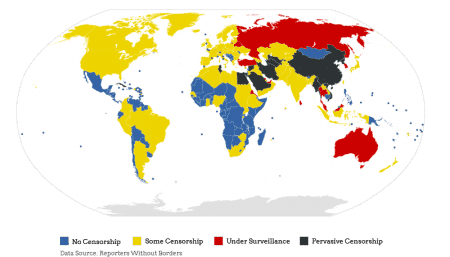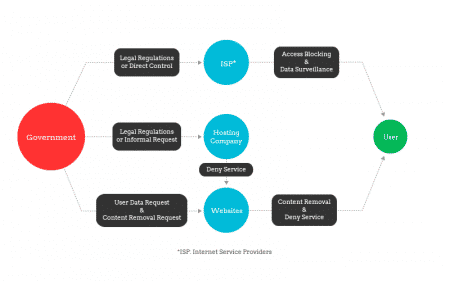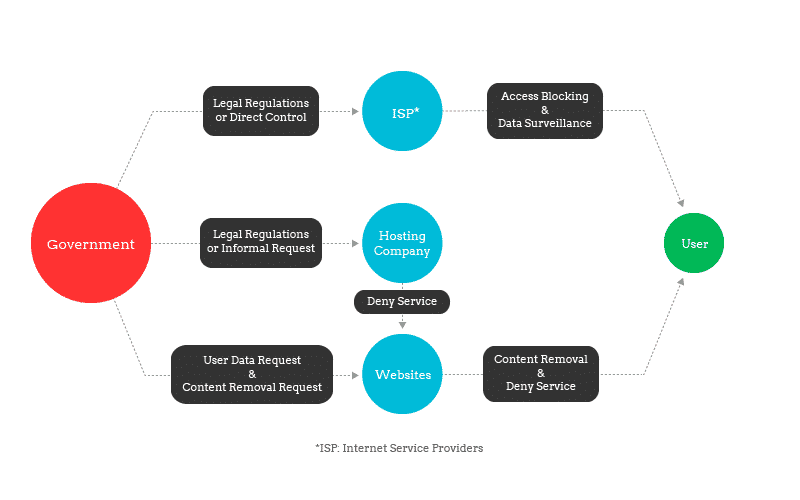Een kleine website probeert het grote publiek bewust te maken van internetcensuur. Al te weinig mensen zijn zich bewust van hoe groot die censuur wel is. Zelfs de Westerse wereld die zichzelf vaak als voorbeeld ziet komt er minder fraai uit. Neem gerust even de tijd om alles te lezen.

Welke landen censureren hun internet?
- Zware censuur: China, Cuba, Egypte, Iran, Myanmar (Birma) Oezbekistan, Saudi-Arabië, Syrië, Tunesië, Turkmenistan, Vietnam.
- Onder toezicht: Australië, Bahrein, Eritrea, Maleisië, Rusland, Thailand, Turkije, Verenigde Arabische Emiraten, Wit-Rusland, Zuid-Korea.
- Matige censuur Europa, Amerika, Noord-Afrika, nog enkel andere landen.
- Geen censuur: de meeste arme landen met weinig budget voor internet monitoring.
Wat wordt gecensureerd online?
- 20% Blogs
- 19% Politieke partijen
- 9% Individuen
- 9% Lokale NGO’s
- Andere: pornografie, sociale netwerken, video websites, religieuze informatie.
Hoe censureert men het web?
De overheid kan ingrijpen langsheen de hele keten tussen internet en gebruiker.

Waarom al die online censuur?
- Traditionele sociale waarden bewaren.
- Politieke stabiliteit.
- Nationale veiligheid
Wat nu?
De hele wereld zit dus dik in de puree. Er zijn uiteraard verschillen qua intensiteit en schaal van de online censuur. Momenteel lijkt Afrika nog vrij terrein, maar als het mij vraagt zouden die overheden net hetzelfde doen moesten ze over genoeg budgetten beschikken. En nu er steeds meer mensen van het internet gaan gebruikmaken zal de situatie er niet gauw op verbeteren.

I think this is a little exagarated. The only websites the UK government censors for example are ones which are known to contain images of child pornography, which most people would I think believe to be fair enough
True. Compared to Australia or Russia, the UK is not so bad. But perhaps the examples you mention are not exhaustive. Any chance you can get your hands on a more complete overview?
I have only read wikipedia article on it, the only things they state are child pornography. there have been cases made by politicians or newspapers for other things to be censored, but nothing else has been done. Difficult to tell however as the organisation in charge does not release lists of banned websites, although they did get in trouble once for censoring a Wikipedia page containing an album cover with a picture of a naked child on it, although they removed it after a couple of days.
We have the same censorship as Pakistan and Iraq? And more than most central african states???
Well, perhaps if we count all the pornography websites being blocked in the Western world, we might end up with similarly high numbers. I don’t see any other way for this to make sense.
Central african states have virtually no internet anyway, so no need for censorship, whereas they do seem to be grouping together european states with minor censorship for child porn etc as I mentioned above with states which block far more stuff, such as al porn, or political sites. Given they have 3 settings, “some” “Survelance” or “perversive” I think the methods they use for defining it are very arbitrary.